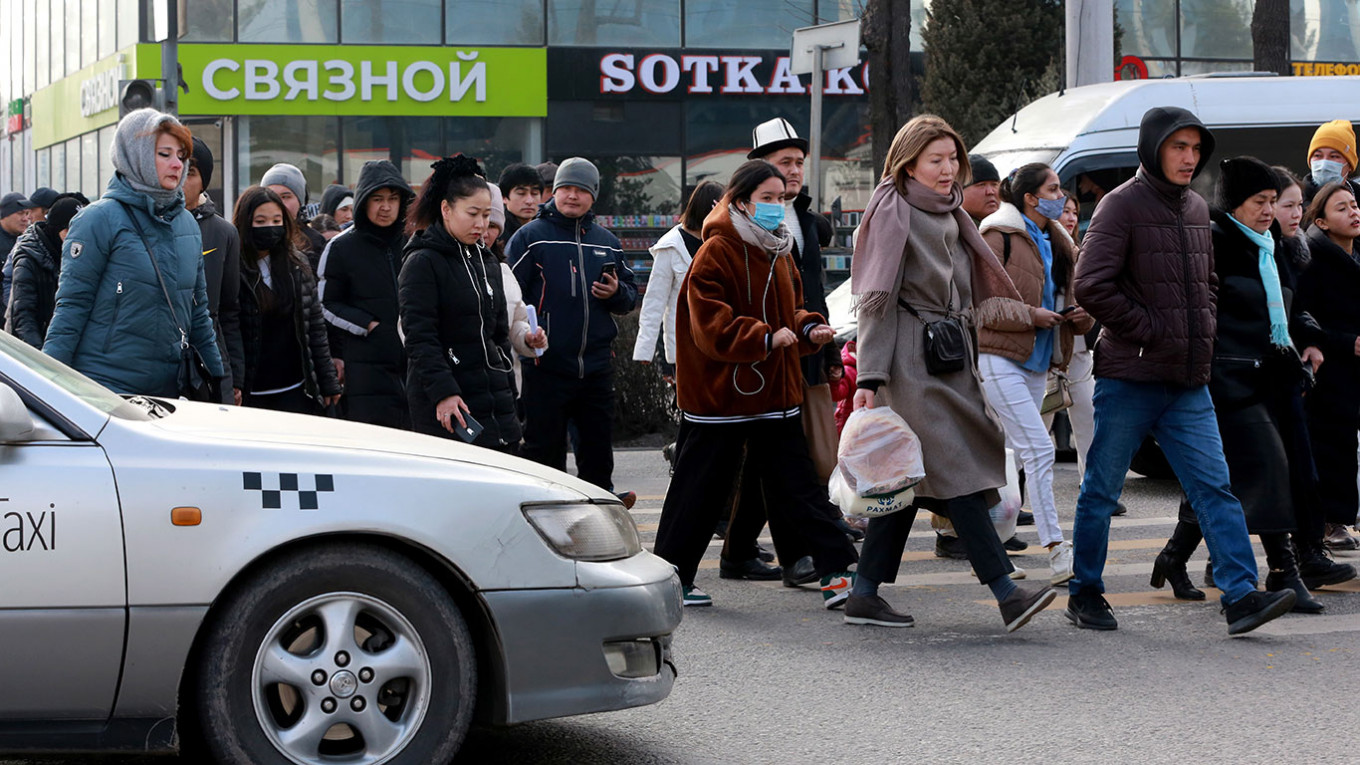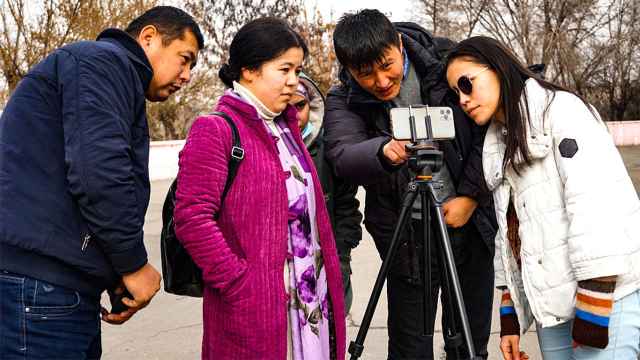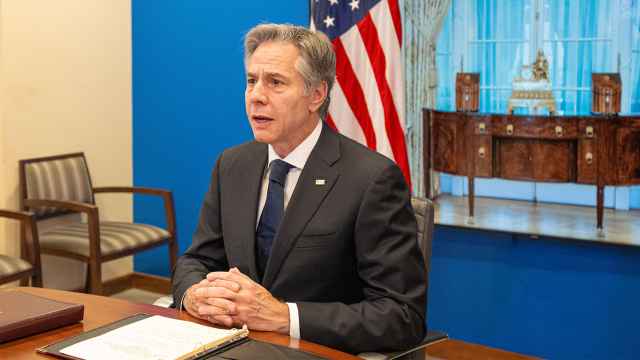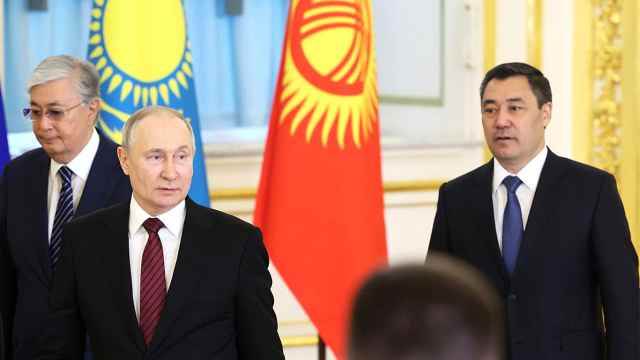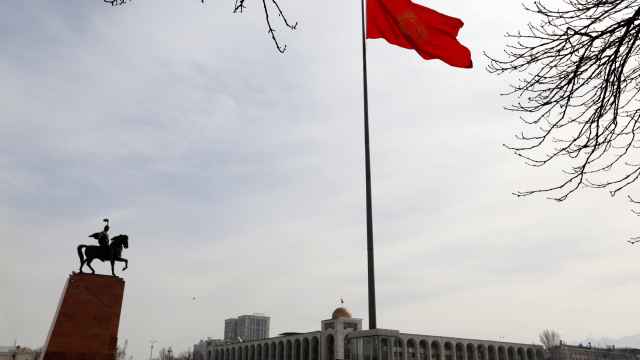BISHKEK, Kyrgyzstan - When Kirill Shamiev’s friends started talking about martial law, he realized it was time to leave Russia.
A week into Russia’s invasion of Ukraine, Shamiev — a 26-year-old Ph.D. student from St. Petersburg who works as a policy consultant for European companies — began to worry he himself might be mobilized, or simply be trapped in Russia.
“I’d heard from some friends who are connected to the government that there was going to be martial law, and the borders would be closed,” said Shamiev.
With air tickets to Turkey, Armenia and the Persian Gulf selling out fast, Shamiev was left with a convoluted route out of Russia: a flight to the Urals city of Yekaterinburg, then a connection to Bishkek, the Central Asian republic of Kyrgyzstan’s capital.
“It’s cheap here, and people are friendly to Russians,” said Shamiev, who has since left for a European Union country.
Thousands of anti-war Russians have fled their homeland as authorities rammed through draconian new laws against anti-war dissent and domestic repression ramped up. But with European countries’ airspace now closed to Russian flights, most of Russia’s new emigres are heading for the countries of the former Soviet space.
It was last week, as rumors of impending martial law and border closures swirled in Moscow, when many Russians began to make for the exits.
The Mediazona news site, now blocked in Russia, reported military-age men being extensively questioned by the FSB security service at the border, with some having their text messages read by officers.
With European airspace closed and now-sanctioned Russian airlines ceasing international flights after leasing companies began to demand the return of their planes, surging demand for escapes met sharply declining supply.
One-way tickets to Dubai were priced at almost $4,000, while flights to Yerevan, Armenia were going for $1,840, according to the flight aggregator SkyScanner, which has since announced it is halting operations in Russia.
The Georgian government has said that as many as 25,000 Russians have entered the country in recent days as the wave of emigration accelerated.
On social media, some dubbed Armenia’s capital Yerevan as the “new Constantinople,” referring to the Ottoman-era name of Istanbul, where many Russian emigres fled after the October Revolution and civil war in the 1920s.
Tickets to Bishkek, a tree-lined, Soviet-built city largely unfamiliar to most Russians, were much cheaper, at around $300 apiece.
Even so, when a reporter from The Moscow Times flew to Bishkek last Thursday, the plane — a Boeing 777 with a capacity of almost 400 — was packed out, mostly with Russians.
At Bishkek airport, an unrenovated Soviet-era hulk, affluent middle-class families with children in strollers and bohemian youths, some clutching guitars, said they were relieved to have left their homeland and anxious about their new lives as political emigres.
With many having left in a hurry, Russian arrivals interviewed by The Moscow Times said that comparatively cheap and overwhelmingly Russian-speaking Kyrgyzstan’s lax visa policy — which allows Russian citizens to remain indefinitely — was the main attraction.
Throughout Bishkek, a Soviet-built city of 1 million inhabitants surrounded by snow-capped mountains, the influx of Russians was evident.
Bishkek’s hotels and restaurants were full of incomers.
One of them was Ilya Yaroshenko, a 26-year-old cryptocurrency investor who had fled St. Petersburg via Moscow, spooked by rumors of martial law.
“The war is obviously completely obscene,” said Yaroshenko, a committed opponent of Vladimir Putin who spent time in jail last year for attending protests in support of imprisoned Kremlin critic Alexei Navalny.
“I decided to leave after I spoke to my parents on the phone,” said Yaroshenko, who is originally from Russia’s Baltic exclave of Kaliningrad, which is cut off from the mainland by Poland and Lithuania.
“They were saying how Putin was right, and how it was just a quick operation to destroy the Ukrainian fascists. That made me realize how messed up everything is.”
As the flood of Russian emigrants made its way through the airport’s passport control, Kyrgyzstani authorities seemed almost bemused by the new arrivals.
Asked the purpose of her visit, one 20-something Russian woman prompted an audible chuckle from her border guard when she said she had come as a tourist.
“Tourism … for now,” she mumbled sheepishly.
Even so, Kyrgyzstan is not entirely safe territory for opponents of Russia’s war in Ukraine.
Heavily economically dependent on Russia, where around 1 million of its 6 million citizens live and work, the Kyrgyzstani government has gone to great lengths not to offend Moscow, even as the local currency has posted sharp losses against the dollar.
Traditionally the most democratic country in Central Asia, having undergone three revolutions since 2005, Kyrgyzstan has shut down two opposition media outlets for their coverage of the war.
According to a Kremlin readout of a call with Kyrgyzstani President Sadyr Japarov — a populist swept to power in an October 2020 revolution — Bishkek backed Moscow’s move against Kyiv.
In response, during a March 1 video address, a khaki-clad Ukrainian President Volodymyr Zelenskiy recalled his country’s ambassador from Kyrgyzstan.
On the streets of Bishkek, where public opinion is broadly pro-Russian, there was occasional evidence of opposition to the war.
Since the beginning of the war, a small group of pro-Kyiv protestors have been picketing outside the Russian embassy, a drab Soviet-era building on a central Bishkek street.
On Saturday, The Moscow Times witnessed the protesters dispersed under threat of arrest, as police vans pulled up and men in plain clothes filmed the small gathering.
“We are against this imperialist war,” said one of the protesters, a pensioner who identified himself as Marat and said he had a brother in Kyiv.
“Putin must be stopped at all costs.”
Nor is life away from home easy for the emigres.
Over the weekend, U.S.-backed credit card providers announced they were blocking Russian-issued cards from working overseas while allowing them to continue functioning in Russia. It’s a move that will cut off Russians who’ve fled overseas from their bank accounts.
However, with political repression in Russia escalating, many emigres see staying abroad as preferable to running the gauntlet at home.
Cryptocurrency investor Yaroshenko said he planned to stay in Kyrgyzstan for the foreseeable future, and said that he was thinking of basing himself in nearby Almaty, Kazakhstan in the future.
“I’d like to go back to Russia if there’s some dramatic change there,” he said.
“But I don’t think that’s especially likely at the moment.”
A Message from The Moscow Times:
Dear readers,
We are facing unprecedented challenges. Russia's Prosecutor General's Office has designated The Moscow Times as an "undesirable" organization, criminalizing our work and putting our staff at risk of prosecution. This follows our earlier unjust labeling as a "foreign agent."
These actions are direct attempts to silence independent journalism in Russia. The authorities claim our work "discredits the decisions of the Russian leadership." We see things differently: we strive to provide accurate, unbiased reporting on Russia.
We, the journalists of The Moscow Times, refuse to be silenced. But to continue our work, we need your help.
Your support, no matter how small, makes a world of difference. If you can, please support us monthly starting from just $2. It's quick to set up, and every contribution makes a significant impact.
By supporting The Moscow Times, you're defending open, independent journalism in the face of repression. Thank you for standing with us.
Remind me later.



